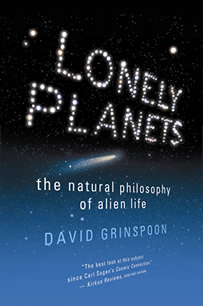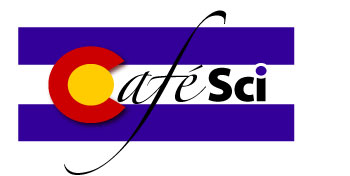Award-winning writer David Grinspoon is an internationally known Planetary Scientist funded by NASA to study the evolution of Earthlike planets elsewhere in the universe. He is currently Principal Scientist in the Department of Space Studies at the Southwest Research Institute in Boulder, Colorado, and Adjunct Professor of Astrophysical and Planetary Science at the University of Colorado. Dr. Grinspoon serves as an advisor to NASA on space exploration strategy, and has lectured and published widely. His first book, Venus Revealed, was a Los Angeles Times Book Prize finalist. His latest book, Lonely Planets: The Natural Philosophy of Alien Life won the 2004 PEN literary award for nonfiction. His popular writing has appeared in Slate, Scientific American, Natural History, The Sciences, Astronomy, the Boston Globe and the New York Times. His technical papers have been published in Nature, Science, and numerous other journals. Dr. Grinspoon has been featured on numerous television and radio shows, including PBS’s “Life Beyond Earth,” BBC’s “The Planets,” NPR’s Science Fridays and Weekend Edition, and BBC World Service. He is also an award-winning musician who has played guitar and sung in several great bands destined for obscurity. Grinspoon lives in Denver |
 |
Lonely Planets
David Grinspoon's new book: Lonely Planets: The Natural Philosophy of Alien Life (Ecco, 2004) won the 2004 PEN literary award for nonfiction. It is available widely. Reviews for it have been overwhelmingly enthusiastic. Here are some excerpts: "After a pretty interesting history of belief in extraterrestrials, Grinspoon offers an excellent summary of all the branches of science that are involved with this new field of "astrobiology," or the study of possible alien life. Comparative planetology, physics, and geology play a large role in determining how many worlds out there would be capable of supporting life (Jupiter's moon Europa is the current local favorite). From biology we find that we don't really know exactly what life is, and we should not necessarily expect aliens to be dependent on water and oxygen. The final parts of the book, dealing with religion, psychology, and sociology (including some debunking of ufology and other fads) show that we cannot expect aliens to be similar to us in any of those areas, and they may be so different from us culturally, mentally, and physically that we may not even recognize them as other intelligent life forms, especially when they are likely to be more advanced than us"."Lonely Planets is a substantial book, covering the origins of life on Earth as well as the changes in religious and social thought that have affected astronomers' search for other planets and their theoretical inhabitants. Grinspoon's style is exuberant, even a little cocky, and the result is delightful readability. Lonely Planets lets readers share the dismay of finding out there are probably no Martians and the thrill of wondering if there might be Europans. 'I think our galaxy is full of species,' writes Grinspoon. 'The wise ones are out there waiting for us to join them'..." But he also warns us that "Expecting to find DNA elsewhere is like expecting a Star Trek universe with humanoid aliens who speak English and insist that we join them for dinner at eight." "His style is conversational and friendly, which is not a bad trick for a rocket scientist." One reviewer mentioned, though it's not certain whether in protest or admiration, an "endless supply of cheesy jokes." |
 |
An Annotated Reading List
Borrowed from: David's Lonely Planets web site
The bible of books about SETI is still Intelligent Life in the Universe by Iosif Shklovskii and Carl Sagan, published originally in Russian as Shklovskii’s Universe, Life, and Intelligence (1962) , and first published (to Shklovskii’s surprise, as described in the text) as a dual–author English–language book in 1966. This book has been re–issued numerous times and is currently in print (Emerson–Adams, Boca Raton 1998).
The quintessential Carl Sagan book about extraterrestrial life is The Cosmic Connection, An Extraterrestrial Perspective (Dell, New York 1975). Another worthy book from this era, often overlooked, is The Galactic Club, Intelligent Life in Outer Space, by Ronald N. Bracewell (W. H. Freeman, San Francisco 1974).
More recent good books about SETI include Is Anyone Out There? The Scientific Search for Extraterrestrial Intelligence by Frank Drake, and Dava Sobel (Dell, New York 1994); and Seth Shostak’s, Sharing the Universe, Perspectives on Extraterrestrial Life, (Berkeley Hills, Berkeley 1998).
Iosif Shklovskii’s personal recollections on his involvement in SETI, and his own rationale for his increasingly pessimistic beliefs about alien contact are described in his autobiography, Five Billion Vodka Bottles to the Moon, Tales of a Soviet Scientist, (W. W. Norton, New York 1991). A valuable collection of essays representing the "contact pessimist" school, fueled by the Fermi–Hart paradox, is Extraterrestrials: Where Are They?, edited by Ben Zuckerman and Michael Hart (Pergammon, 1982).
The literature on UFOs and alien encounters is vast, and a complete bibliographic essay would alone take up a large volume. An excellent recent book which treats the subject from a religious studies perspective, and contains very extensive references, is Brenda Denzler’s The Lure of the Edge: Scientific Passions, Religious Beliefs, and the Pursuit of UFO’s. (University of California Press, Berkeley 2001). A lighthearted and delightfully illustrated account of American UFO culture is presented in Douglas Curran’s In Advance of the Landing, Folk Concepts of Outer Space (Abbeville, New York 2001).
Numerous stories of alien encounters and other strange phenomena in Colorado’s San Luis Valley can be read in Christopher O’Brien’s The Mysterious Valley, (St. Martin’s Press, New York 1996). The scientific perspective on UFOs is well represented in UFO’s, A Scientific Debate, edited by Carl Sagan, and Thornton Page (W.W. Norton, 1972), in Carl Sagan’s The Demon Haunted World (Random House, 1996) and in frequent articles in the magazine Skeptical Enquirer.
Two good books on the Roswell “incident” are The Roswell Report: Case Closed, by Captain James McAndrew of the United States Air Force, (Headquarters USAF, Washington, DC 1997) and Roswell, Inconvenient Facts and the Will to Believe by Karl T. Pflock, a veteran UFOlogist who describes his journey from Roswell believer to skeptic (Prometheus, New York 2001).
For a seemingly endless stream of superficially convincing reports of crashed saucers, hidden alien bodies and “black ops” government complicity with alien civilizations, read Dr. Steven M. Greer’s Disclosure, Military and Government Witnesses Reveal the Greatest Secrets in Modern History (Carden Jennings, Charlottesville 2001). John Mack’s work with experiencers and his interpretation of the abduction phenomenon are described in Passport to the Cosmos, Human transformation and Alien Encounters (Random House, New York 1999. Frank Drake explains his strong belief that the aliens whom we eventually contact through SETI are likely to come from immortal civilizations in “On Hands and Knees in Search of Elysium”, Technology Review, 78, June, 1976.
